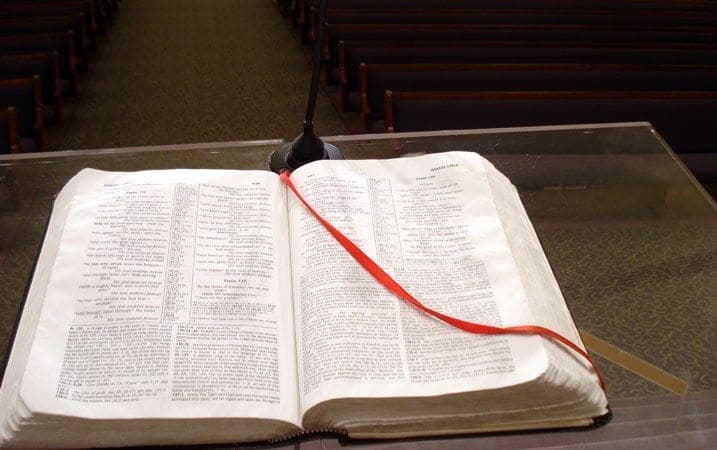Q. At Mass recently, I was stunned by a statement made by the deacon who was giving the homily. That has made me wonder whether deacons have sole independence when preparing remarks, or if the priest exercises oversight. (City of origin withheld)
A. On the parish level, the pastor has the ultimate responsibility for the orthodoxy and propriety of what is said from the pulpit. To answer your question directly: A deacon does not have “sole independence” for his remarks.
In practice, though, rarely does this result in the pastor’s “pre-screening” a deacon’s homilies. By the very fact that he has allowed and invited the deacon to preach, the pastor has indicated his confidence that the deacon will handle things maturely and well. Deacons do not pop up suddenly from a congregation on a Sunday morning.
Before being ordained, deacons undergo a fairly intensive “vetting” process that includes several years of theological education, psychological evaluation, and tutoring in pastoral techniques.
Returning to your question, you would be best advised to bring your concern to your pastor. If he, like you, is “stunned” by what the deacon is said to have said, he will surely bring it to the deacon’s attention to avoid future problems. If he deems it necessary, the pastor might even see fit to make a correction from the pulpit.
Q. Jan. 1, 2016, was a holy day of obligation. But our parish calendar shows that next year, Jan. 1 will not be a holy day of obligation — i.e., Jan. 1, 2017.
If holy days are so important, why do some oblige Mass attendance while others do not? Doesn’t this send a message that some of them are not really that critical? Also, for the past two years, even while it has been a holy day of obligation, our church has scheduled only one Mass on Jan. 1.
Obviously, the entire parish cannot fit into the church for one Mass. Isn’t this a tacit acknowledgement that this feast day is not very important? (Clifton, New Jersey)
A. The feast of Mary, the mother of God, takes place on Jan. 1, 2016, and is a holy day of obligation. That means that Catholics in the United States have a serious responsibility, binding under the pain of sin, to participate at the celebration of the Eucharist on that day.
The following year, the feast you mention happens to fall on a Sunday. Parishioners are already obliged to be at Mass on that day.
The best answer to your question can be found in this: Each national conference of bishops has the prerogative of determining the holy days of obligation for their country.
In 1991, the bishops of the United States decided that whenever Jan. 1, Aug. 15, and Nov. 1 take place on a Saturday or a Monday, the obligation to attend Mass is lifted. (In other words, your presence at a weekend Mass would “cover you” both for the feast day and for the Sunday.)
But on two holy days, American Catholics are obliged to go to a feast day Mass no matter on what day they occur — Christmas and Dec. 8 (the Immaculate Conception, which is the patronal feast of our nation).
Does that mean that the bishops considered these two days to be “more important” than the other holy days? That seems a logical conclusion, but it remains true that the other holy days were still important enough in the mind of the bishops to require attendance at Mass.
As to your concern about your parish offering only one Mass on Jan. 1 even when it has been a holy day of obligation, I agree with you. I don’t think it’s an acknowledgement that this particular feast is not important, but it may be a concession that Mass on this date is not nearly as well attended as it ought to be — and pedagogically, I don’t think it’s good to cater to people’s delinquency.
I would think it better, if priests are available, to have at least two feast day Masses — perhaps a vigil early in the evening on Dec. 31 and then a morning Mass on Jan. 1, to make it more convenient for people to fulfill their obligation and start the new year off right by seeking the blessing of the Lord.















